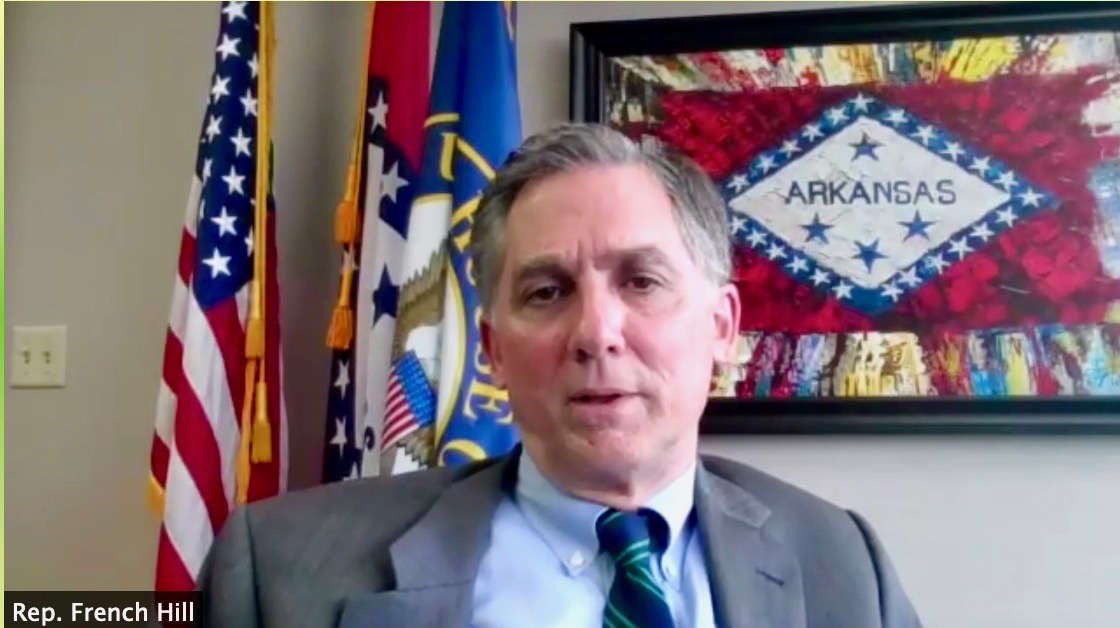WASHINGTON DC – In remarks to a virtual meeting of The Ripon Society on Wednesday, U.S. Rep. French Hill (AR-2) discussed the work he is doing in Congress to ensure the federal government is addressing the coronavirus pandemic in a responsible and efficient way. Hill began his remarks by outlining his top priorities on Capitol Hill.
“Members in both parties are working hard at tackling the virus,” the Republican lawmaker stated. “We are working hard to kill the virus and cure the public health crisis, and then get our economy back to full strength. I want to touch on three things related to that today. First, the Paycheck Protection Program.
“I was looking at the statistics here in the state of Arkansas. We have 40,000 businesses that have gotten almost $3.4 billion in money to keep their employees employed and keep their doors open. That eight weeks of money is really the secret to trying to get this economy back open and I think the PPP program will be seen as an instrumental success story when we look back on it in a few years. As of today, we’ve spent just over $500 billion of the $610 billion that Congress authorized, and the applications have really begun to fall off. I think we are reaching the people that needed to be reached and obviously it was sole proprietors and self-employed people.”
Hill’s second point of focus is the SAVE Act – a bill he recently introduced in the House to better prepare the United States for future public health emergencies. In light of recent revelations surrounding the largely outsourced medical supply chain, Hill sees bringing production back to the U.S. as an essential step.
“I proposed the SAVE Act to amend the Defense Production Act. Harry Truman signed the DPA into a law back in 1950, and it was following up on the war powers and following up on even the old War Finance Corporation back in World War I where we would be able to compel production domestically for badly needed national defense items. It was a preparatory issue in the midst of getting ready for Korea.
“I propose that we amend the DPA to include medical supply chain, the pharmaceutical supply chain, and the medical device supply chain, and that the President be compelled to do a study on how to use our free market system to be prepared for a more diverse supply chain – diverse in the United States and diverse around the world. This, in my view, is critical.”
According to Hill, the country is vulnerable in crises like the one being experienced today due to most of the critical medical supplies being sourced and produced beyond the borders of the U.S.
“In the pharmaceutical area, about 40% of manufactured, completed pharmaceuticals are made outside the U.S. We have about 28% here in America and about 2% or 3% in Canada. You have another quarter of it manufactured in Europe. You have 18% manufactured in India and about 13% in China. That’s the finished manufactured pharmaceutical. But look what China has done in acetaminophen and penicillin, and in a lot of active ingredients. In other words, look at the chemical compounds that go into those pharmaceuticals. They’ve built a supply chain that controls that, sort of like a strategic mineral. China has cornered the market on these key active ingredients that go in pharmaceuticals.
“Finally, in device manufacturing. We all know the stories about ventilators. Arkansas ordered a total of 3,500 ventilators made by General Electric in China. Our bid was for the first 500 to be delivered on April 7th at $19,000 a unit. And guess what? Governor Cuomo ordered 50,000 units and offered to pay $39,000 for it. So, guess who got the order? I have a problem with that. There’s the free market system working, but why were the states trying to bid against FEMA and bidding against one another?”
Hill also talked about the oversight commission for the CARES Act, which he was recently asked to serve on.
“Kevin McCarthy asked me to serve on the oversight commission of the Cares Act. There are five members of the Cares Act oversight commission. It’s bipartisan, and a Chair to be chosen by Speaker Pelosi and Leader McConnell. It’s a consensus-organized oversight body with the mission of overseeing the $500 billion in taxpayer money that’s been appropriated and delivered to the Treasury’s Exchange Stabilization Fund. Our mission is watching that money and how it gets leveraged by Jay Powell at the Federal Reserve system to aid the American economic recovery from this pandemic. I’m proud to serve in that capacity.”
Finally, the Arkansas legislator was asked about the U.S.-China relationship going forward, and how, if at all, this pandemic has shaped the dynamic.
“There’s a lot of rhetoric around China right now,” Hill explained. “Are we going to enter a new Cold War, and is the new villain – I don’t want to use that word casually – going to be China? We’re going to go into a new 50- or 60-year struggle there between the West and Western values and Western democratic values and sort of a vision of Chinese communism that President Xi has pivoted to since starting in 2013. But it’s China’s time now after 200 years of humiliation by the world from his point of view. Look, it wasn’t America that contributed to any of that humiliation. I’ll say we were a friend to China during the Opium Wars in the 1830s, when the British and China were at each other’s throats over trade and access to trade in China. It was America and American diplomats that taught the Chinese self-defense in that environment.”
Hill continued.
“I would argue we’re old friends with the Chinese people, to use their term in the Southeast Asian sense. We’re not old friends with their current Communist Party leadership, but we’re old friends with the Chinese people. We need to keep that in mind. But the Communist Party of China has pivoted and they’re clearly going for a different relationship on national security, global economic security, and trade. And now we see their behavior in this pandemic.
“In my opinion, their reputation is in tatters, not that of the Chinese people, but of the Communist Party in China. It will be in tatters at the United Nations, the World Health Organization ,in bilateral relations, and trade. So, they’re in trouble in my judgment and I think we’ll reset relations with China now. Not just the United States, but we’ll now have support – more support than what we had when President Trump was elected – in pressing them for change in all of these areas.”
The Ripon Society is a public policy organization that was founded in 1962 and takes its name from the town where the Republican Party was born in 1854 – Ripon, Wisconsin. One of the main goals of The Ripon Society is to promote the ideas and principles that have made America great and contributed to the GOP’s success. These ideas include keeping our nation secure, keeping taxes low and having a federal government that is smaller, smarter and more accountable to the people.




